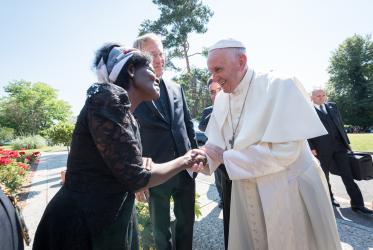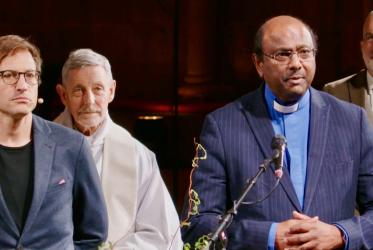A 50-year-old religious text can shape interreligious relationships crucial for peace-building today, found participants in a workshop organized by the World Council of Churches (WCC) and attended by guests from the Vatican’s Pontifical Council for Interreligious Dialogue (PCID) on 28 October.
The workshop focused on the the Second Vatican Council document Nostra Aetate. First promulgated on 28 October 1965, it has influenced the positive development of interreligious relations, not only in the Roman Catholic Church, but among other Christians and many other people of faith.
The PCID and the WCC office for Interreligious Dialogue and Cooperation marked the close of the 50th anniversary year since the document appeared by exploring the paths that interreligious dialogue might tread in the future.
Participants, who met in the Ecumenical Centre in Geneva, Switzerland, included staff members from various organizations based in the centre, and those working in Geneva in the field of interreligious relations. Three members of the PCID also participated in the meeting.
The workshop took a key sentence from the original text of Nostra Aetate as its starting point: “The Church, therefore, exhorts her sons, that through dialogue and collaboration with the followers of other religions, carried out with prudence and love and in witness to the Christian faith and life, they recognize, preserve and promote the good things, spiritual and moral, as well as the socio-cultural values found among these men.” It was acknowledged that the language of the original text was not gender inclusive.
Those gathered explored what “prudence”, “love” and “witness” might mean for those committed to interreligious engagement in 2016 and in the future, explained Dr Clare Amos, WCC programme executive for Interreligious Dialogue and Cooperation.
In what participants called “a vivid and thought provoking presentation,” Rev. Dr Peniel Rajkumar, also a programme executive for Interreligious Dialogue and Cooperation, explored the centrality of prudence - which he noted is a virtue closely linked to wisdom - in religious thinking, past and present.
Amos added: “There was special interest in the concept of ‘prudence’ as this is a virtue that is not so regularly explored in dialogue. Participants were also invited to add ‘leaves’ expressing their vision and hopes to a tree that formed a centre-piece at the workshop. The importance of education as a tool for interreligious dialogue and interreligious peace-building was very clear.”
The workshop formed part of a sequence of events marking the formation of a newly created reference group for interreligious dialogue in the WCC. It was prefaced on 26 October by a public lecture “Interreligious dialogue in an age of violent fundamentalisms" given by Rev. Dr Sathianathan Clarke of Wesley Theological Seminary, and was followed by a day of meetings for the reference group in which some of the paths for the interreligious work of the WCC were outlined.
Learn about the WCC programme on Interreligious Dialogue and Cooperation





